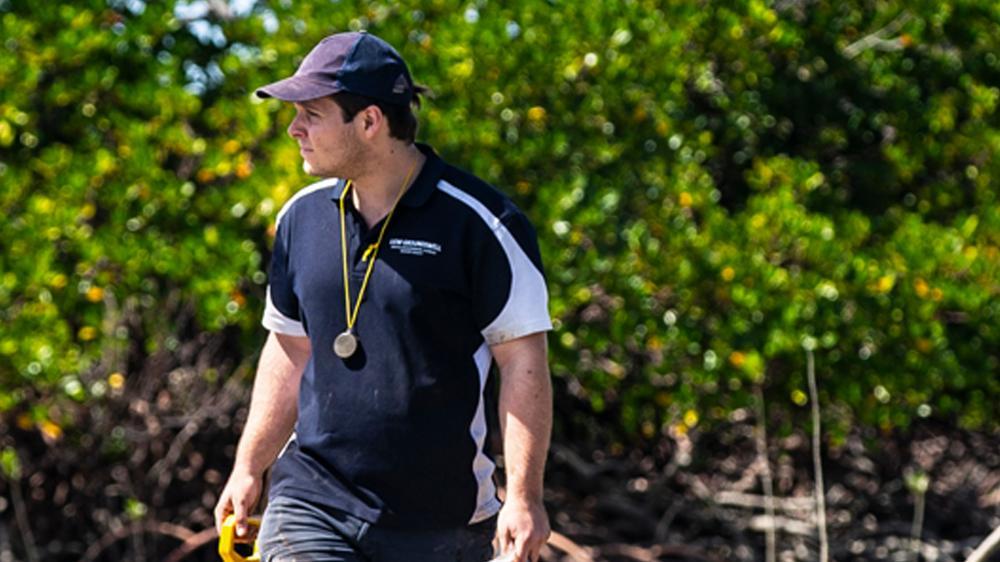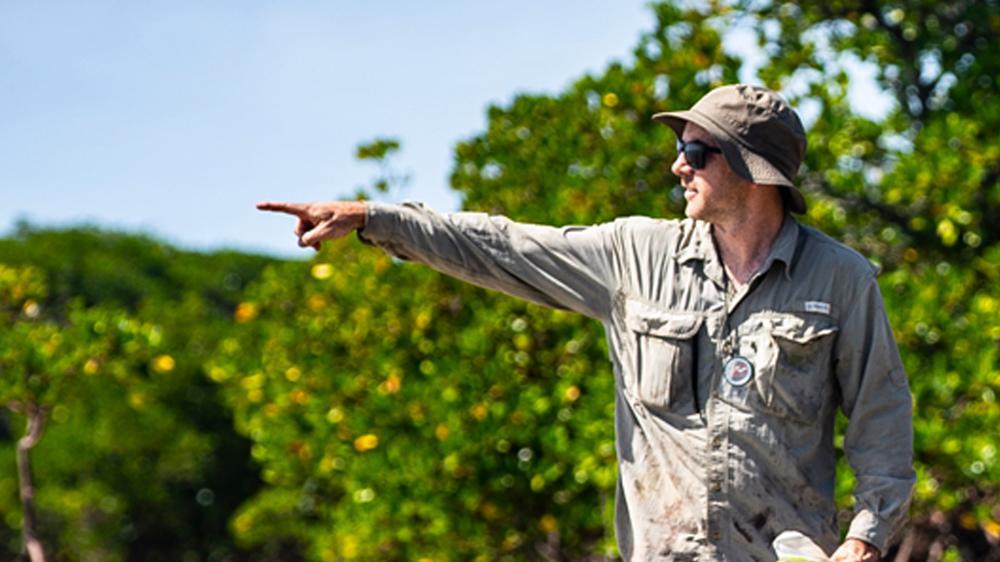The two of us: Jeff Kelleway and Zachary Nagel-Tynan
Behind every great PhD candidate is a dedicated supervisor (or two)
September 15, 2021
PhD Candidate Zachary Nagel-Tynan is investigating what processes are occurring below ground in coastal wetland ecosystems. His supervisor is School of Earth, Atmospheric and Life Sciences, Vice Chancellor's Research Fellow Dr Jeff Kelleway.
Meet the candidate
Zachary Nagel-Tynan

Zachary Nagel-Tynan
Can you give a description of the topic or question you are investigating?
My research will be investigating the processes occurring below ground in coastal wetland ecosystems. It will focus on the role of decomposition and below ground net primary production in the supratidal forested wetlands of temperate Australia.
How did you select your research topic? Where does your interest in this field come from?
I began studying coastal wetlands, during the end of my 3rd year of undergrad. Since then, I have been investigating different topics to help broaden my knowledge of coastal wetlands while gaining experience and implementing the various techniques used throughout this field of study. I had recently been introduced to decomposition work at the end of my honours and it slowly made its way to being a key component of my research as the project developed.
How did you find your supervisor?
I was lucky enough to have been assigned into the wetland group for EESC320 Capstone, which at the time was not where my interest lied. I quickly found myself loving the topic and approached Jeff, who was co-supervising the group about potential options for honours projects. From there I have been lucky enough to work with Jeff on several projects, and throughout my Honours year and couldn’t have asked for a better, more supportive supervisor. When the time came to choose someone to supervise my postgraduate studies it was an easy decision to make.
How do you think your research can change the world?
I’d like to think that my research can help promote conservation and restoration projects for wetland environments. Coastal wetlands are highly valuable within the environment, whether it be their role within the global carbon budget, or as a habitat to the many residents that call these community’s home. Through preservation, we can not only protect these vital ecologic communities, but help to mitigate the impacts of global climate change.
What advice would you give someone considering doing postgraduate studies?
Having only just started, this is a hard question for me to answer. However, my one bit of advice would be to have faith in yourself. The main hurdle I have faced, along with a few other in my cohort, is whether I should/deserve to be here. You just have to tell yourself that you are there for a reason, remind yourself that you not only love what you do, but you’re good at it too.
Meet the supervisor
Dr Jeff Kelleway

Dr Jeff Kelleway
Can you explain your area of expertise?
I'm an Environmental Scientist and I specialise in wetland ecosystems. In particular, I'm interested in how coastal wetlands, including mangroves, saltmarshes and coastal wetland forests are responding to climate change and sea-level rise. My research in the field of 'blue carbon' investigates the carbon cycle of these coastal ecosystems, and explores whether restoration and management of these ecosystems can help draw more carbon dioxide out of the atmosphere and therefore play a part in combating climate change.
How did you find yourself where you are now professionally?
I took a bit of a long and winding road to get where I am at the moment. After finishing my Honours year in 2004 (a project on coastal wetlands), I was fortunate to work in a couple of different roles in the NSW public service undertaking research projects on coastal and freshwater wetlands. I also lived and worked overseas for a few years, and tried a stint as an environmental consultant. During this time I was offered a few invitations to undertake postgraduate research, but I chose to wait until the 'time was right' for me. In 2013 I commenced my PhD candidature at the University of Technology Sydney, on a topic that I was very excited about - understanding the emerging concept of 'blue carbon' in Australia's coastal wetlands.
What makes a great PhD candidate?
For me, the attributes to a great PhD candidate include (1) a strong desire to learn and grow professionally, (2) enthusiasm and passion for the topic of research, and (3) a willingness to ask questions, seek feedback and learn from any setbacks or failures.
How do you guide candidates on their journey?
Zac is the first student I'm supervising, so this is something I'm learning as I go. I'm fortunate to be able to draw on the experience of some fantastic mentors, and my own positive experiences of supervision from my PhD candidature. I'm also drawing on my experiences supervising several Honours and Masters students in recent years. My approach is to try spend quality time in the field and lab, building up their technical skills and getting their research up and running, then supporting their growth as an independent researcher.
What should candidates consider when finding a supervisor?
I think it's important to do some research about potential supervisors and their broader research group. While finding a supervisor with a similar research interest is important, I'd suggest trying to get a feel for how you'll be supported in your candidature - does the supervisor have a good reputation for supporting independent learning and development? Are they part of a research group (including other PhD candidates, post-docs, etc) and have resources that will benefit your candidature?
To learn more about Jeff Kelleway take a look at his Scholars Profile
To get in touch with Zachary Nagel-Tynan
To learn more about the School of Earth, Atmospheric and Life Sciences